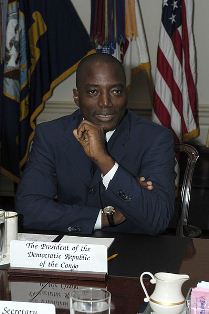 KINSHASA, Congo (AP) -- Provisional results published by Congo's election commission on Friday handed victory to President Joseph Kabila who won another term with 49 percent of the 18.14 million votes cast.
KINSHASA, Congo (AP) -- Provisional results published by Congo's election commission on Friday handed victory to President Joseph Kabila who won another term with 49 percent of the 18.14 million votes cast.
Longtime opposition leader Etienne Tshisekedi trailed with 32 percent of the vote, according to the final tallies released by election commission chief Daniel Ngoy Mulunda.
Tshisekedi's supporters vowed to take to the streets if Kabila was declared the winner. Tires were being burned near some vote counting centers.
But Mulunda warned before reading the final results: "The candidates must understand that in every election there is a winner and there is one or several losers."
In the tightly controlled pro-Kabila downtown neighborhood in Kinshasa near the election commission, people hung out of balconies cheering after the results were released. A woman danced in the street.
Police in riot gear in trucks stood at attention.
In the Limite neighborhood of Kinshasa, where Tshisekedi lives, the mood was dark.
"This is a total disaster," said Fabien Bukasa, a Tshisekedi supporter. "We are thinking about what to do. We do not know what will happen."
Although international observers said the vote was flawed, they have stopped short of calling it fraudulent. Most say irregularities were not widespread enough to have caused a change in outcome. However, the perception among opposition supporters is that Tshisekedi won, setting the stage for a confrontation.
Some residents have left the country, fearing violence. Election violence has already left at least 18 dead and more than 100 wounded, with most of the deaths caused by troops loyal to Kabila, according to a report by Human Rights Watch.
This was only the second democratic election in Congo's 51-year history, and the first to be organized entirely by the government instead of by the international community.
Kabila, a former rebel leader, first took control of the country a decade ago, after the 2001 assassination of his father, Laurent Kabila, who ruled Congo after overthrowing dictator Mobutu Sese Seko in 1997.
Kabila was then elected president in 2006, a vote which was overseen and organized by the U.N.
Congo's enormous geography has proved challenging both for the electoral commission organizing the vote as well as for the country's government. Its vast rain forests in the east still harbor vicious rebel armies, including remnants of the Interhamwe, the militia responsible for Rwanda's 1994 genocide.
Congo has survived two civil wars, which together pulled in nine neighboring countries in a conflict that ate at the heart of Africa. Even though Congo is the size of Western Europe, it remains one of the globe's most impoverished nations recently listed dead last on the United Nations worldwide index of human development.
Results must now be approved by the Supreme Court.
---
Associated Press reporter Jerome Delay in Kinshasa, Congo contributed to this report.
© 2011 The Associated Press. All rights reserved. This material may not be published, broadcast, rewritten or redistributed. Learn more about our Privacy Policy and Terms of Use.
Portland and Seattle
Free Subscription to Breaking News
Free Subscription to Breaking News





















































































































































































































































































































































